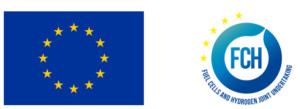The Elyntegration Project has reached its first year of developments. This project has the strategic goal of design an alkaline electrolyser connected to the grid to produce 4.5 tonH2/day, involving research centres, manufacturers and technology providers from Spain, Switzerland, Germany and Belgium.
Since September 2015, the consortium has worked in the study of the European countries regulatory frameworks. The purpose of the analysis is to find the operating mode that allows the alkaline electrolyser to operate producing hydrogen and at the same time providing grid services. With these additional capabilities, the electrolyser could be an additional tool or technology to help stabilize the grid, providing demand response characteristic or peak shaving capabilities in a grid with a high penetration of renewable energy generation.
An electrolyser being capable of providing this kind of service demands requires a set of additional capabilities regarding power, flexibility and power modulation, which have been determined during this first year of the project as technological goals for stack components, balance of plant and control system.
Developments
To reach these objectives, new separators, electrodes and cells are being developed in order to provide a safe and optimal performance. These new components, which are already being tested at lab scale and micro pilot scale, will be proved to guarantee durability and test degradation within the next months, before selecting the best performers to be tested at full scale during the last months of the project.
The partners of Elyntegration are Fundación para el desarrollo de las Nuevas Tecnologías del Hidrógeno en Aragón (FHA, www.hidrogenoaragon.org), Industrie Haute Technologie SA (IHT, www.iht.ch), Vlaamse Instelling voor Technologisch Onderzoek (VITO, www.vito.be), Fraunhofer-Institut für Fertigungstechnik und Angewandte Materialforschun (Fraunhofer IFAM, www.ifam-fraunhofer.de), Instrumentación y Componentes (INYCOM, www.inycom.es) and Institut und Lehrstuhl für Elektrische Anlagen und Energiewirtschaft (IAEW Aachen, www.iaew.rwth-aachen.de).
This project has received funding from the Fuel Cells and Hydrogen 2 Joint Undertaking under grant agreement No 671458. This Joint Undertaking receives support from the European Union’s Horizon 2020 research and innovation programme and Spain, Belgium, Germany, Switzerland



